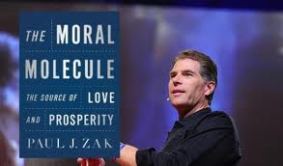 Paul Zak began studying oxytocin as a measure of trust. When oxytocin is present in our brains and blood streams, we are happier, more generous and more trusting. Great! So how do we increase oxytocin to get people to be more generous and trusting? It’s got a half-life of three minutes, but you can bring it on by hugging, dancing, sex, massage, praying… or for a more professional environment, people will produce oxytocin if they feel you trust them. Economies with a higher level of trust are more prosperous (although I wouldn’t jump to conclusions about cause and effect here).
Paul Zak began studying oxytocin as a measure of trust. When oxytocin is present in our brains and blood streams, we are happier, more generous and more trusting. Great! So how do we increase oxytocin to get people to be more generous and trusting? It’s got a half-life of three minutes, but you can bring it on by hugging, dancing, sex, massage, praying… or for a more professional environment, people will produce oxytocin if they feel you trust them. Economies with a higher level of trust are more prosperous (although I wouldn’t jump to conclusions about cause and effect here).
I’m interested in what other people think the implications for this are in terms of giving and social investment. I wonder if models of funding that involve collaboration and connectedness are more likely to work because they’re boosted by this biological reaction to trust. Some risk sharing and risk management strategies may be more successful if they include a display of trust in other parties. This recognises that the way we behave with money isn’t driven exclusively by financial return, but by how much we value sharing and connecting with others.
Paul Zak is Professor of Economics and the founding Director of the Center for Neuroeconomics Studies at Claremont Graduate University. His new book is called “The Moral Molecule“. This Sydney Morning Herald article is a good summary of his work in the area and his 17 minute TED talk Trust, morality — and oxytocin is worth a watch.
My favourite bit, quoted here from the article, was the description of this experiment – flies in the face of Game Theory!
The starting point was a persistent mystery in Zak’s original field, economics: time and again, in experiments, people behave more generously than traditional economic models predict that they should. A classic demonstration of this is known as the Trust Game, in which pairs of participants communicate with each other via computer terminals: they never meet, and have no idea who the other person is. Person A is given GBP10 ($15.20), then invited to send a portion of it, electronically, to person B. Person A has a motive for doing so: according to the rules, which both players know about, any money that A sends to B will triple in value, whereupon B will have the option of sending some of it back as a thank-you. According to conventional notions of rational behaviour, the game should break down before it has begun. Person B, acting selfishly, has no reason to give any money back – and, knowing this, person A shouldn’t send any over in the first place.
Yet, in trials of the game, 90 per cent of A-people send money, while 95 per cent of B-people send some back. Analysis of the oxytocin in their bloodstreams reveals what is going on: by sending money to person B, person A is giving a sign of trust – and being on the receiving end of a sign of trust, it emerges, causes oxytocin to increase, motivating more generous behaviour in return. And it is not just receiving free money that causes people to feel oxytocin’s “warm glow”: in other studies Zak has conducted, random windfalls don’t cause nearly so much of it to be released. What counts is being trusted: trust in one person triggers oxytocin in the other, which triggers more trustworthy behaviour, and so on, in a virtuous circle. “Well, that’s except for the 5 per cent of people who are ‘unconditional non-reciprocators’,” says Zak, referring to the consistent minority of people who seem immune to this cycle. “What we call them in my lab is ‘bastards’.”
